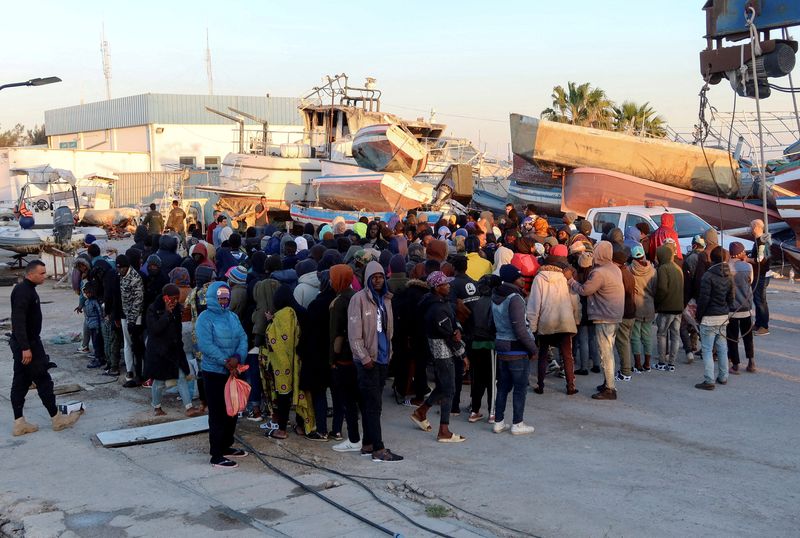Rights group urges Tunisia to halt collective expulsions of African migrants
2023.07.07 00:06

© Reuters. FILE PHOTO: Migrants wait at Sfax port, after being stopped by Tunisian coast guard at sea during their attempt to cross to Italy, Tunisia April 26, 2023. REUTERS/Jihed Abidellaoui/File Photo
By Tarek Amara
TUNIS (Reuters) – Tunisia should halt collective expulsions of sub-Saharan African migrants and urgently enable access to humanitarian services for those the government sent to a dangerous area of the Tunisia-Libya border, Human Rights Watch (HRW) said on Thursday.
Tunisia has removed hundreds of the migrants to a desolate area along the border, a Tunisian rights group and a lawmaker said on Wednesday, with witnesses reporting dozens more put on outbound trains following days of violence.
Disturbances between migrants and residents went on for a week in the port of Sfax, and one Tunisian was killed. Residents complained of disorderly behaviour by migrants and migrants complained of racist harassment.
Thousands of undocumented migrants have flocked to Sfax in recent months with the goal of setting off for Europe in boats run by human traffickers, amounting to an unprecedented migration crisis for Tunisia.
The people expelled were of many African nationalities:
Ivorian, Cameroonian, Malian, Guinean, Chadian, Sudanese, Senegalese, and included 29 children and three pregnant women, HRW said.
“Not only is it unconscionable to abuse people and abandon them in the desert, but collective expulsions violate international law,” said Lauren Seibert, refugee and migrant rights researcher at HRW.
The Tunisian interior ministry did not respond to requests for comment.
The International Organization for Migration in Libya said that despite the challenges in having access to the area, it was able to provide some emergency medical assistance to some migrants.
While the authorities transferred hundreds near the Libyan border, dozens of other African migrants are sleeping in the street near the Lakhmi Mosque in Sfax, witnesses said.
Videos showed some residents providing them with food and water.
There has been a surge in migration across the Mediterranean from Tunisia in north Africa this year after a crackdown by Tunis on migrants from sub-Saharan Africa living in the country illegally and reports of racist attacks.
Tunisia is under pressure from Europe to stop large numbers of migrants departing from its coasts. But President Kais Saied said that Tunisia will not be a border guard and that it will not accept the settlement of immigrants in the country.








